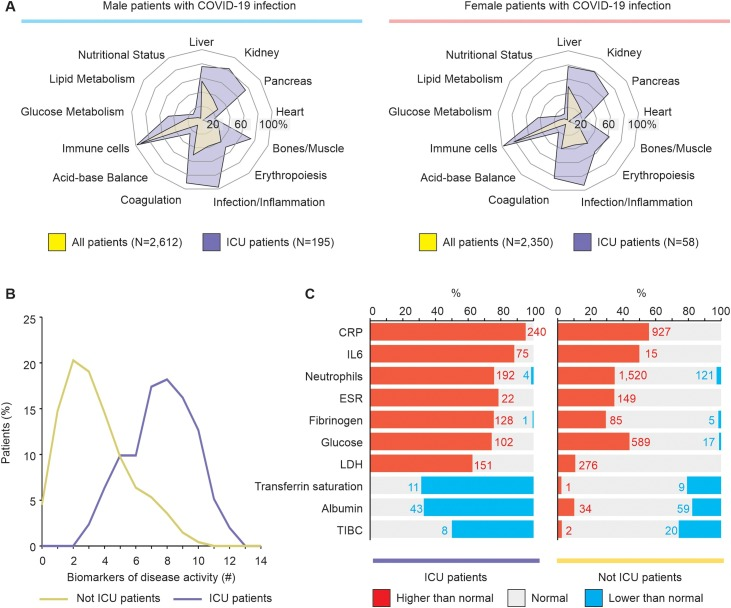In-depth analysis of laboratory parameters reveals the interplay between sex, age, and systemic inflammation in individuals with COVID-19.
The progression and severity of COVID-19 varies significantly in the population. While the hallmarks of SARS-CoV-2 and severe COVID-19 within routine laboratory parameters are emerging, the impact of sex and age on these profiles is still unknown. We performed multidimensional analysis of millions of records of laboratory parameters and diagnostic tests for 178,887 individuals from Brazil, of which 33,266 tested positive for SARS-CoV-2. These included complete blood cell count, electrolytes, metabolites, arterial blood gases, enzymes, hormones, cancer biomarkers, and others. COVID-19 induced similar alterations in laboratory parameters in males and females. CRP and ferritin were increased especially in older men with COVID-19, whereas abnormal liver function tests were common across several age groups, except for young women. Low peripheral blood basophils and eosinophils were more common in the elderly with COVID-19. Both male and female COVID-19 patients admitted to intensive care units displayed alterations in the coagulation system, and higher values of neutrophils, CRP and lactate dehydrogenase. Our study uncovers the laboratory profile of a large cohort of COVID-19 patients that underly discrepancies influenced by aging and biological sex. These profiles directly link COVID-19 disease presentation to an intricate interplay between sex, age and immune activation.
Authors
Felipe Ten-Caten; Patrícia Gonzalez-Dias; Ícaro Castro; Rodrigo L T Ogava; Jeevan Giddaluru; Juan Carlo S Silva; Felipe Martins; André N A Gonçalves; André G Costa-Martins; José D Araujo; Ana Carolina Viegas; Fernando Q Cunha; Sandra Farsky; Fernando A Bozza; Anna S Levin; Pia S Pannaraj; Thushan I de Silva; Paola Minoprio; Fabiano Pinheiro da Silva; Bruno B Andrade; Helder I Nakaya
External link
Publication Year
Publication Journal
Associeted Project
Network & Precision Medicine
Lista de serviços
-
StructRNAfinder: an automated pipeline and web server for RNA families prediction.StructRNAfinder: an automated pipeline and web server for RNA families prediction.
-
CEMiTool: a Bioconductor package for performing comprehensive modular co-expression analyses.CEMiTool: a Bioconductor package for performing comprehensive modular co-expression analyses.
-
webCEMiTool: Co-expression Modular Analysis Made Easy.webCEMiTool: Co-expression Modular Analysis Made Easy.
-
Assessing the Impact of Sample Heterogeneity on Transcriptome Analysis of Human Diseases Using MDP Webtool.Assessing the Impact of Sample Heterogeneity on Transcriptome Analysis of Human Diseases Using MDP Webtool.
-
Predicting RNA Families in Nucleotide Sequences Using StructRNAfinder.Predicting RNA Families in Nucleotide Sequences Using StructRNAfinder.
-
OUTBREAK: a user-friendly georeferencing online tool for disease surveillance.OUTBREAK: a user-friendly georeferencing online tool for disease surveillance.
-
Noninvasive prenatal paternity determination using microhaplotypes: a pilot study.Noninvasive prenatal paternity determination using microhaplotypes: a pilot study.
-
Editorial: User-Friendly Tools Applied to Genetics or Systems Biology.Editorial: User-Friendly Tools Applied to Genetics or Systems Biology.
-
Automatic detection of the parasite Trypanosoma cruzi in blood smears using a machine learning approach applied to mobile phone imagesAutomatic detection of the parasite Trypanosoma cruzi in blood smears using a machine learning approach applied to mobile phone images
-
Tucuxi-BLAST: Enabling fast and accurate record linkage of large-scale health-related administrative databases through a DNA-encoded approachTucuxi-BLAST: Enabling fast and accurate record linkage of large-scale health-related administrative databases through a DNA-encoded approach
-
Ten quick tips for harnessing the power of ChatGPT in computational biologyTen quick tips for harnessing the power of ChatGPT in computational biology

